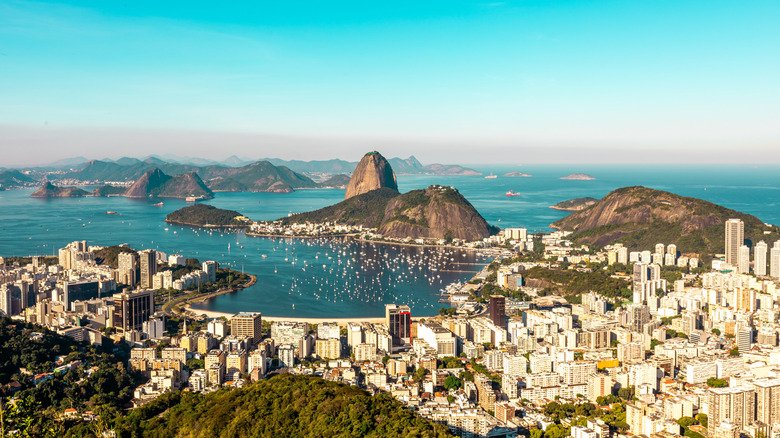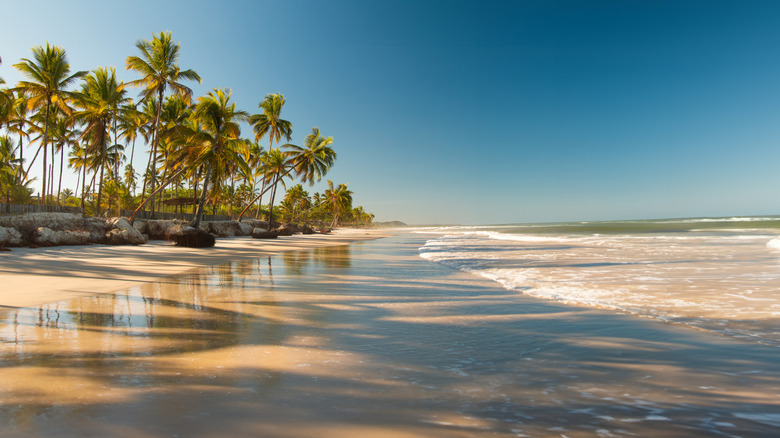The Least Safe Country In South America For Women Is A Popular Vacation Destination
South America is a stunning place to visit, home to 12 countries with an array of breathtaking offerings. In 2023 alone, over 30 million international travelers ventured to this captivating continent. However, when planning a trip, it is crucial to consider local safety data, especially for female travelers. In recent years, one country has stood out as particularly dangerous: Brazil. Known for its lush Amazon rainforest, stunning beaches, renowned soccer players, and vibrant culture, Brazil has much to offer — but travelers must approach with caution.
Violence against women has been a persistent challenge in Latin America, and the statistics are alarming. A woman falls victim to femicide in Latin America every two hours. In 2021 alone, over 4,000 women were killed due to gender-based violence in Latin America. In Brazil, the pandemic exacerbated this crisis, with violence against women nearly doubling during that time and continuing to rise ever since. Today, Brazil ranks as the most dangerous country for women in South America and the second most dangerous globally, trailing only South Africa.
Despite years of protests from Brazilian women demanding stronger policies against femicide, the government has made insufficient progress. Protesters are calling for harsher laws for perpetrators, who often face minimal consequences. They argue that current policies lack enforcement and fail to address the systemic issues underlying gender-based violence. While the majority of perpetrators are known to their victims, it is not uncommon for these crimes to be committed by strangers, further underscoring the need for comprehensive preventative measures. International institutions such as the United Nations Human Rights Office and the Inter-American Court of Human Rights have also condemned the impunity. In response, they have developed model protocols to aid regional governments in combating femicide and providing women with access to international resources for addressing these crimes.
The reality of safety in Brazil
Brazil's natural beauty and cultural richness make it a desirable destination. However, it's vital for travelers — particularly women — to stay informed and vigilant. Surveys reveal that only 28% of women in Brazil feel safe walking alone at night, a lower percentage than both Mexico and the Dominican Republic with 33%, according to the World Population Review. Brazil ranks as the second-most dangerous country for women globally in 2024, with the third-highest rate of intentional homicide against women and the sixth-highest rate of sexual violence. Rondônia, a northwestern state, had the highest femicide rate in 2023.
In response to these risks, the U.S. Department of State issued a travel advisory for Brazil in 2023. The advisory highlights areas with elevated dangers, including land borders, informal housing developments known as "favelas," and "satellite cities." Travelers are cautioned to avoid resisting robbery attempts, accepting food or drinks from strangers, walking or using public transportation at night, and visiting places such as bars, nightclubs, beaches, or hiking trails alone.
That said, these warnings do not mean travelers should avoid Brazil altogether. Rather, they emphasize the importance of exercising heightened precautions while exploring this remarkable country with plenty of stunning destinations.
If you or anyone you know has been a victim of sexual assault, help is available. Visit the Rape, Abuse & Incest National Network website or contact RAINN's National Helpline at 1-800-656-HOPE (4673).
Exploring Brazil safely
Brazil's challenges should not overshadow its undeniable allure. The country's natural wonders, vibrant festivals, and welcoming people make it a must-visit destination. However, taking certain measures can help ensure a safer and more enjoyable experience, particularly for women. Before traveling, enrolling in the Smart Traveler Enrollment Program is highly recommended. This program allows travelers to receive safety alerts and facilitates assistance in emergencies. Additionally, reviewing the Country Security Report for Brazil and consulting a traveler's checklist can optimize preparedness.
When it comes to protecting belongings, it is advisable to use a cross-body sling bag rather than storing valuables in pockets. At the beach, travelers should either keep their bags with them while sunbathing or use waterproof fanny packs when entering the water. Debit and credit cards are best left securely locked in a hotel room, with only one travel credit card carried for emergencies. Similarly, passports should remain safely stored in the hotel, while photocopies can be carried for daily activities. Travelers should also aim to stay low-key, avoiding flashy jewelry or items that might attract unwanted attention. It's important to steer clear of deserted or poorly lit areas, especially at night. Being mindful of one's surroundings is essential, particularly in crowded places, and traveling with companions can significantly enhance safety, as solo travel poses additional risks.
Brazil is a land of extraordinary beauty, offering unforgettable experiences to those who visit. While safety concerns for women are significant, they do not have to deter travelers from exploring this incredible country. By staying informed, taking precautions, being wary of dangerous South American cities, and remaining vigilant, visitors can enjoy all that Brazil has to offer while minimizing risks.


